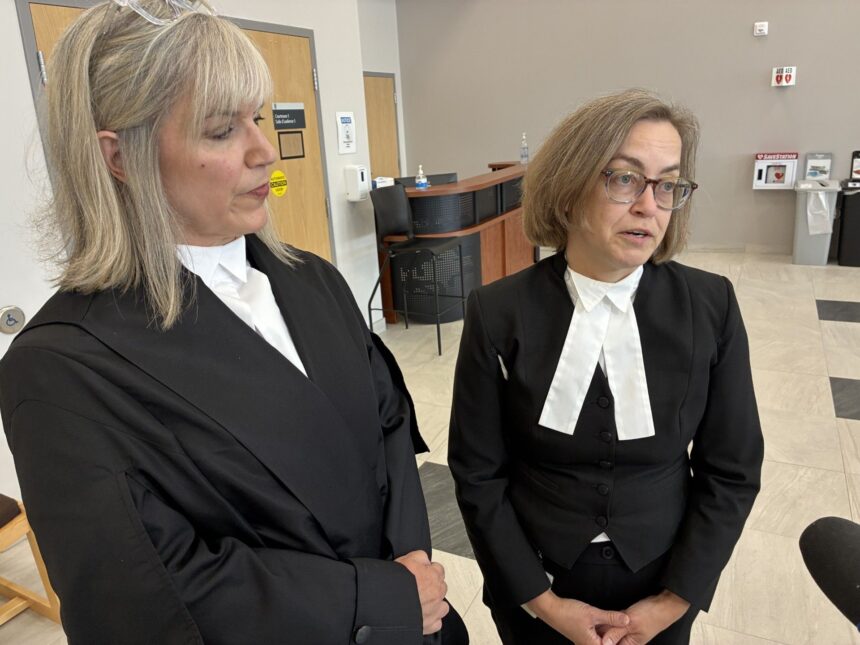Article contentCampbell scheduled Dechamp’s sentencing hearing for Oct. 15. The second-degree murder conviction also carries a mandatory sentence of life in prison, but the judge will decide how many years Dechamp must serve – somewhere between 10 and 25 – before he can apply for parole.Article content Crown attorneys Kim McOnie, left, and Tanya Carter speak with reporters Tuesday after Tyrell Peter Dechamp pleaded guilty in Nova Scotia Supreme Court in Dartmouth to charges of second-degree murder and attempted murder from a 2016 double shooting in Halifax. Photo by Steve BruceArticle contentCrown attorney Kim McOnie read a brief agreed statement of facts into the record that she and colleague Tanya Carter worked out with defence lawyer Brian Munro.Article contentAccording to those facts, Clayton suffered multiple gunshot wounds and had a loaded handgun in the rear waistband of his pants.Article content“It’s very good news that Mr. Dechamp decided to acknowledge responsibility today,” Carter told reporters outside court. “We were able to advise (Clayton’s) family straight away, and they were very relieved.Article content“It’s been a long time coming. It’s been nine and half years, so we’re quite pleased that we were able to wrap this up this morning.”Article contentArticle contentCarter said the prosecutors dealt with the delays in the case “as best we can” and were prepared to call evidence from upwards of 80 people at trial.Article content“We did everything we could to get ready and have the witnesses ready to go tomorrow, but we’re grateful … that we didn’t have to go through that process,” she said.Article contentShe said she and McOnie have already had some discussions about what they will seek in the way of parole ineligibility.Article content“We have a lot of things to consider, obviously, given that he’s already serving a life sentence,” Carter said. “We don’t want to say any more about that at this time.”Article contentDechamp was only 17 when he fatally stabbed Matthew Ayre in the neck on Gottingen Street in Halifax on Oct. 15, 2007. Because of his age, his identity was protected under the Youth Criminal Justice Act when he was sentenced for murder in 2009.Article contentBut Dechamp’s identity became public in July 2012, when he was sentenced in Supreme Court for the aggravated assault, for sucker-punching a woman during an altercation on a street in downtown Halifax in 2011.Article contentArticle content“Mr. Dechamp, when you think about it, is a very lucky man,” Chief Justice Joseph Kennedy said in 2012 in accepting a joint recommendation from lawyers. “He’s a lucky guy. He’s lucky because he’s not here today on another murder charge, and that’s only dumb luck, because that woman’s brain was swelling.Article content“People who aren’t so lucky are people who run into Mr. Dechamp in circumstances where he’s likely to become angry, because he does dramatic damage to them. … That’s not unheard of in our society. We have dangerous people in this society, people who cannot be free, and that’s why we build federal institutions.Article content“There’s been some indication, Mr. Dechamp, that you are interested in being in that federal institution, which is good because you are likely to be there for most of the rest of your life.Article content“There’s something the matter with you, Mr. Dechamp, seriously the matter, and we cannot allow you to function in society.”
Man already serving life sentence for April 2016 Halifax shooting admits committing another murder two days later











